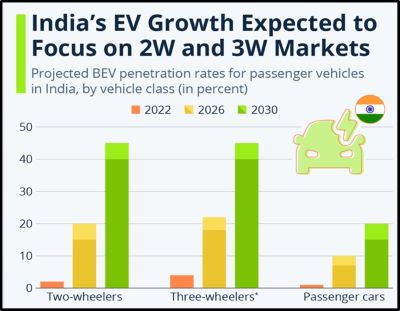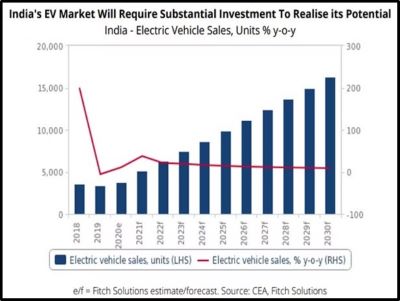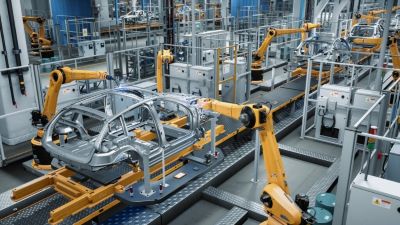Context-
In March 2024, the Indian government approved a comprehensive policy aimed at positioning the country as a prominent manufacturing hub for Electric Vehicles (EVs). This policy initiative, coupled with minimum investment requirements totaling ₹4,150 crore, signals a strategic move to attract global EV manufacturers like Tesla and BYD to the Indian market. The central objective of this policy is to facilitate the transition towards localized EV production in a commercially sustainable manner, tailored to the demands and conditions of the domestic market.
Key Provisions of the Policy
● One of the pivotal provisions of the policy involves a significant reduction in import duties on electric vehicles brought into India as Completely Built Units (CBUs), with a minimum CIF (Cost, Insurance, and Freight) value of $35,000.
● These duties are set to decrease to 15% for five years, down from the existing high rates ranging from 70% to 100%.
● However, to benefit from this reduced tariff, manufacturers are required to establish local manufacturing facilities within three years of entering the Indian market.
● Moreover, the policy outlines substantial duty waivers amounting to ₹6,484 crore or a proportionate amount linked to the investment made by the manufacturers, subject to certain conditions.
● Importantly, there is a cap on the number of EVs that can be imported under this scheme, limited to 40,000 units with an annual cap of 8,000 units, contingent upon a minimum investment of $800 million.
● A strategic move to attract global EV manufacturers like Tesla and BYD to the Indian market.
Domestic Players' Reactions
The response from domestic players to this policy has been mixed. Tata Motors, for instance, expressed concerns over the proposal, particularly regarding the potential adverse impact of reduced import duties on the domestic industry. They argued that such measures could undermine the investment climate for local manufacturers.
The Reports pointed out that most Indian players currently dominate segments priced below ₹29 lakh. Therefore, the import duty reduction, primarily benefiting higher-end segments, appears more advantageous to global OEMs and Indian joint ventures targeting affluent consumers.
Challenges and Opportunities for Electric Vehicle Adoption
Despite the policy incentives, several challenges persist in scaling up electric vehicle adoption in India. One critical area of concern is the limited penetration of electric passenger vehicles, accounting for only 2.2% of the market. While there has been substantial penetration in the two and three-wheeler segments.

This tepid uptake is attributed to factors such as inadequate charging infrastructure, range anxiety, and a scarcity of affordable EV models due to constrained localization efforts.

To address these challenges and foster a conducive environment for electric mobility, a multifaceted approach is imperative. The Confederation of Indian Industry (CII) has highlighted the urgent need for an extensive charging infrastructure network, estimating a requirement of at least 13 lakh charging stations by 2030 to support aggressive EV adoption targets.
Local Circumstances and Market Realities
The Energy and Resources Institute (TERI), emphasizes the significance of considering local circumstances and market dynamics when global players establish their presence in India. Factors such as environmental conditions, road infrastructure, driving behaviors, and usage patterns play a pivotal role in shaping the success of EV adoption.
Additionally, the Institute for Studies in Industrial Development underscores the importance of developing a robust EV ecosystem capable of ensuring component reliability, durability, and effective service support. He advocates for a shift towards sustainable product and system designs driven by domestic demand, which can then pave the way for successful exports in the future.
Conclusion
In conclusion, India's endeavor to bolster EV production through targeted policy interventions reflects a strategic commitment to embrace sustainable mobility solutions. However, achieving widespread electric vehicle adoption necessitates addressing complex challenges ranging from infrastructure deficits to localization imperatives. By harnessing the synergies between global expertise and local insights, India can pave the way for a vibrant and sustainable electric vehicle ecosystem that aligns with its developmental goals and societal needs.
|
Probable Questions for UPSC Mains Exam- 1. How are recent Indian policy initiatives aimed at boosting Electric Vehicle (EV) production attracting global manufacturers like Tesla and BYD? Analyze the impact of reduced import duties and requirements for local manufacturing on the Indian EV industry. Discuss challenges and opportunities in increasing EV adoption in India. (10 Marks, 150 Words) 2. Why is developing a robust Electric Vehicle (EV) ecosystem crucial for widespread adoption of sustainable mobility in India? Highlight key challenges hindering EV penetration in the passenger vehicle market and propose solutions considering factors such as charging infrastructure and localization needs. (15 Marks, 250 Words) |
Source- The Hindu







